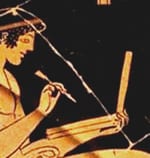Digital Classsicist London 2017 seminar programme
By Simon Mahony, on 23 May 2017

The Digital Classicist London 2017 seminar programme is now confirmed. Looking at the titles and abstracts, you will see that these are all Digital Humanities topics with many from international speakers and their relevance is not limited to the study of the ancient world. The full programme with abstracts is online on the DC website and listed below. The programme poster is available for download. No registration is needed.
Digital Classicist London 2017 Institute of Classical Studies
Fridays at 16:30
Room 234*, Senate House south block, Malet Street, London WC1E 7HU
(*except June 16 & 23, room G34)
ALL WELCOME
Seminars will be screencast on the Digital Classicist London YouTube channel, for the benefit of those who are not able to make it in person.
Jun 2 Sarah Middle (Open University), ‘Linked Data and Ancient World Research: studying past projects from a user perspective’.
Jun 9 Donald Sturgeon (Harvard University), ‘Crowdsourcing a digital library of pre-modern Chinese’.
Jun 16* Valeria Vitale et al. (Institute of Classical Studies), ‘Recogito 2: linked data without the pointy brackets’.
Jun 23* Dimitar Iliev et al. (University of Sofia “St. Kliment Ohridski”), ‘Historical GIS of South-Eastern Europe’.
Jun 30 Lucia Vannini (Institute of Classical Studies), ‘The role of Digital Humanities in Papyrology: Practices and user needs in papyrological research’. Paula Granados García (Open University), ‘Cultural Contact in Early Roman Spain through Linked Open Data resources’.
Jul 7 Elisa Nury (King’s College London), ‘Collation Visualization: Helping Users to Explore Collated Manuscripts’.
Jul 14 Sarah Ketchley (University of Washington), ‘Re-Imagining Nineteenth Century Nile Travel and Excavation for a Digital Age: The Emma B. Andrews Diary Project’.
Jul 21 Dorothea Reule & Pietro Liuzzo (University of Hamburg), ‘Issues in the development of digital projects based on user requirements. The case of Beta maṣāḥǝft’.
Jul 28 Rada Varga (Babeș-Bolyai University, Cluj-Napoca), ‘Romans 1by1: Transferring information from ancient people to modern users’.
Full programme and the abstracts are online at:
http://www.digitalclassicist.org/wip/wip2017.html
Digital Classicist London seminar is organized by Gabriel Bodard, Simona Stoyanova and Valeria Vitale (ICS) and Simon Mahony and Eleanor Robson (UCL).
 Close
Close




 The programme for the Digital Classicist London & Institute of Classical Studies Seminar 2013 is now
The programme for the Digital Classicist London & Institute of Classical Studies Seminar 2013 is now  I’m very pleased to have been invited to open the 2012 Leipzig e-Humanities
I’m very pleased to have been invited to open the 2012 Leipzig e-Humanities